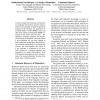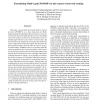528 search results - page 103 / 106 » Causal inference using the algorithmic Markov condition |
110
click to vote
ML
2000
ACM
14 years 9 months ago
2000
ACM
The naive Bayesian classifier provides a simple and effective approach to classifier learning, but its attribute independence assumption is often violated in the real world. A numb...
ICDM
2006
IEEE
15 years 3 months ago
2006
IEEE
When monitoring sensory data (e.g., from a wearable device) the context oftentimes changes abruptly: people move from one situation (e.g., working quietly in their office) to ano...
105
click to vote
ACL
2008
14 years 11 months ago
2008
Accurate unsupervised learning of phonemes of a language directly from speech is demonstrated via an algorithm for joint unsupervised learning of the topology and parameters of a ...
ATAL
2005
Springer
15 years 3 months ago
2005
Springer
Robust sequence prediction is an essential component of an intelligent agent acting in a dynamic world. We consider the case of near-future event prediction by an online learning ...
HICSS
2003
IEEE
15 years 3 months ago
2003
IEEE
This paper uses partially observable Markov decision processes (POMDP’s) as a basic framework for MultiAgent planning. We distinguish three perspectives: first one is that of a...


